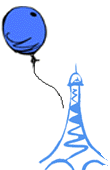| |
| SCBWI
France |
| |
| Meet
the Pros |
| |
| SCBWI France publishes interviews
both in the SCBWI France Expression newsletter
and on-line. These interviews offer an insider's
view of the international children’s
publishing market. |
| |
|
| Elzbieta |
Elzbieta
was born in Poland. She lives
and works in Paris. She shares
her time between painting, photography,
sculpture, and writing and illustrating
children's books, of which she
has published 30 to date. Her
books have been translated and
published in 18 countries.
|
|
 |
 |
|
1.
Alain Machu: "The artist and the child
live in the same country," you write
in your book, L'Enfance de l'art. Tell us
about this universe that children and artists
share?
Elzbieta: Children have an understanding of
the world that adults have lost. They use
other mental processes. The artist, or inventor,
as I prefer to say, needs to use the same
processes, without, nonetheless, being childish.
2. A.M.: But
don't authors or illustrators of children's
books risk being considered childish?
Elzbieta:
People sometimes seem to confuse us with our
audience. But when you write for children,
it's not about being "cute." You
have to take another approach.
3.
A.M.: What do you think about didactic books?
Elzbieta:
There are some writers who teach "facts,"
that is, what we know about the world. They
speak to the part of the child that wants
to learn concrete things. I speak to the speculative
part of the child. Hybrid books are particularly
aggravating. I don't like seeing a story presented
as an innocent fiction, but that in reality
is teaching children another lesson.
4.
A.M.: What advice would you give a beginning
writer or illustrator?
Elzbieta:
Produce, write, draw — in a word, work.
Look around you, submit your work to publishers
only if it fits in with their editorial style.
I think it's useful to know the technical
constraints of publishing, which influence,
of course, an artist's work. It's necessary
to take into account standard book formats
and the rules of printing.
5.
A.M.: What do you think of art schools and
writers' workshops?
Elzbieta:
You make friends there, it's stimulating,
but, beyond the strictly technical side (learning
about the medium, tools, spelling, grammar,
punctuation, etc.) I don't think they are
very useful. The artist's work is a personal
path. In each period, new talents need to
emerge, usually by unpredictable means.
6.
A.M.: And what do you think about manuscript
reviews?
Elzbieta:
Except when done by editors, I don't like
the idea very much. In my opinion, it's a
process that creates a common denominator,
a situation in which people survey and imitate
their neighbors rather than creating something
new. True authors discover who they are "in
doubt and trembling" through their work.
This is a difficult process. It is, perhaps,
easier to give into the opinion of others,
but this leads to a lot of mediocre work.
Alain
Machu |
|
| Top
of page |
|
|
|
|
|
| |
|
|